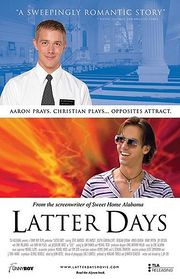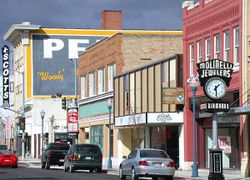Latter Days
| Latter Days | |
|---|---|
 Theatrical release poster |
|
| Directed by | C. Jay Cox |
| Produced by | Jennifer Schaefer Kirkland Tibbels |
| Written by | C. Jay Cox |
| Starring | Wes Ramsey Steve Sandvoss Rebekah Johnson Jacqueline Bisset Mary Kay Place Erik Palladino Amber Benson Joseph Gordon-Levitt Rob McElhenney Dave Power |
| Music by | Eric Allaman |
| Cinematography | Carl Bartels |
| Editing by | John Keitel |
| Studio | Funny Boy Films Davis Entertainment Filmworks |
| Distributed by | TLA Releasing |
| Release date(s) | 2003 |
| Running time | 107 minutes |
| Country | United States |
| Language | English |
| Budget | $850,000 |
Latter Days is a 2003 American romantic drama about a gay relationship between a closeted Mormon missionary and his openly gay neighbor. The film was written and directed by C. Jay Cox. It stars Steve Sandvoss as the missionary, Aaron, and Wes Ramsey as the neighbor, Christian. Joseph Gordon-Levitt appears as Elder Ryder, and Rebekah Johnson as Julie Taylor. Mary Kay Place, Amber Benson and Jacqueline Bisset have supporting roles.
Latter Days premiered at the Philadelphia International Gay & Lesbian Film Festival on July 10, 2003. It was released across the United States over the next 12 months, and was released, mostly at gay film festivals, in a few other countries.[1] It was the first film to portray openly the clash between the principles of The Church of Jesus Christ of Latter-day Saints and homosexuality, and its exhibition in some U.S. states was controversial. Various religious groups demanded that the film be withdrawn from theatres and DVD stores under boycott threats.[2]
The film was met with mixed reactions from film critics, but was popular with most film festival attendees.[3] In 2004, freelance writer T. Fabris made Latter Days into a novel, which was published by Alyson Publications.[4]
Contents |
Plot
Elder Aaron Davis (Steve Sandvoss), a young Mormon missionary from Pocatello, Idaho, is sent to Los Angeles with three other missionaries to spread the Mormon faith. They move into an apartment next to openly gay party boy Christian Markelli (Wes Ramsey) and his roommate Julie, an aspiring singer. Christian and Julie work as waiters at Lila's, a trendy restaurant owned by retired actress Lila Montagne (Jacqueline Bisset).
Christian makes a $50 bet with his cynical co-workers that he can seduce one of the Mormons, and soon realizes that Aaron, the most inexperienced missionary, is a closeted homosexual. Aaron and Christian become acquainted after several encounters in the apartment complex. When Christian accidentally cuts himself on a piece of metal and faints, Aaron helps him indoors and cleans his wound. Christian attempts to seduce Aaron, but the hesitant Mormon becomes upset by Christian's remark that sex "doesn't have to mean anything." Aaron accuses him of being shallow and walks out. Worried that Aaron is correct, Christian joins Project Angel Food, delivering meals to people with AIDS.
Aaron's fellow missionary, Paul Ryder (Joseph Gordon-Levitt), has a cycling accident. Returning to his apartment, a distraught Aaron encounters Christian, who tries to comfort him with a hug. Both men are overwhelmed by their feelings and end up kissing, failing to notice the return of Aaron's roommates. Aaron is sent home in disgrace, leading Christian to confront Ryder, who is angry that Christian corrupted Aaron for no reason. Christian admits that he initially just wanted to win a bet, but says "it's not about that" anymore.
Recognizing Christian's distress, Ryder tells him that Aaron has a five hour layover in Salt Lake City. Christian finds Aaron standing in the snow outside the terminal. Christian confesses his love, and despite his misgivings, Aaron admits his own feelings of love. With all flights cancelled due to a snowstorm, Christian and Aaron spend an intimate night in a motel. When Christian awakes, he finds Aaron gone. Aaron's pocketwatch, a family heirloom, has been left behind. Christian returns to Los Angeles.
In Idaho, Aaron is excommunicated by the church elders, led by his own father, Farron (Jim Ortlieb), who is the Stake President. Aaron is rejected by his father and scolded by his mother (Mary Kay Place), who informs him of the $50 bet she was told about by the Mission President and states that he needs to pray for forgiveness. When Aaron suggests that he might be gay, his mother slaps him. Overwhelmed by despair, Aaron attempts suicide. He is subsequently sent by his parents to a treatment facility to be cured of his homosexuality.
Christian is desperate to find Aaron and locates his home address and phone number. Aaron's mother informs him that "Thanks to you, my son took a razor to his wrists; thanks to you I have lost my son." Believing that Aaron is dead, Christian spends the next few days thinking continually about Aaron. One early morning, Julie finds Christian awake, sitting on the couch. When Christian brushes off her concerns and heads back to bed, Julie discovers a poem in his cellphone, which he also uses as a journal. She uses it as the basis for her new song.
Christian travels to the Davis home in Idaho, where he tearfully returns Aaron's watch to his mother. Though she tries to stop him from leaving, Christian does not hear her. During an encounter with Julie, she hesitantly shows him her new video, which stuns Christian, realizing that part of the lyrics came from his journal. Julie tells Christian that she hoped something good would come from it. Christian feels betrayed because Julie used his journal without his consent.
In the treatment facility, Aaron hears a female voice singing and investigates. He discovers a music video playing on television, the song performed by Julie. The video prompts Aaron to return to Los Angeles in search of Christian. Upon arriving at Christian's apartment, Aaron is heartbroken when a stranger answers the door. Thinking that Christian has returned to his party boy ways and moved on, and having nowhere else to go, Aaron makes his way to Lila's restaurant, whom he befriended while on missionary work after her life partner died. Christian is overjoyed to see Aaron alive, and they reconcile. With Christian's co-workers, they celebrate Thanksgiving. Lila tells everyone present that no matter what, they will always have "a place at my table, and a place in my heart".
Cast

- Steve Sandvoss as Elder Aaron Davis: Aaron is a young Latter-day Saint from Pocatello, Idaho who, while on his Mission, falls in love with Christian and must choose between his sexuality and his church. The producers auditioned a large number of people before casting Sandvoss, saying he "blew us away."[5]
- Wes Ramsey as Christian William Markelli: An LA party animal aspiring to be an actor, Christian has his ideas of happiness and the meaning of life challenged when he falls for the simple but kind-hearted Aaron who has moved in next door. Ramsey said on the DVD Special featurette, "The character of Christian was on so many levels, intriguing to me. I was just so excited and feel very blessed to have the opportunity to tell that story through his eyes."[5]
- Rebekah Johnson as Julie Taylor: Christian's flat-mate, Julie tries to break out into the music world and on the way stop Christian from falling apart.
- Amber Benson as Traci Levine: Traci has moved from New York to LA to become an actress, and works at Lila's to support herself. Traci does not like living in LA, but later admits she didn't like New York much either.
- Khary Payton as Andrew: Andrew is also an aspiring actor, but spends more time at Lila's gossiping and telling racy anecdotes. Andrew has been HIV positive for quite some time, but remains in good health.

- Jacqueline Bisset as Lila Montagne: Lila runs Lila's, a restaurant where Christian, Traci, Julie, and Andrew work. Her lover is terminally ill in hospital and she is forced to decide whether or not to keep him on life support. She still finds time to be sarcastically witty to all the other characters however. Bisset herself said, "I like humor, so I just, I really enjoyed doing all the cracks."[5]
- Joseph Gordon-Levitt as Elder Paul Ryder: A prickly, judgmental young missionary assigned as Aaron's partner, Ryder is not enthusiastic about being in LA and even less so about living next door to a homosexual. Gordon-Levitt originally auditioned to play Aaron, but his aggressive attitude toward the script but good sense of humor made the producers decide he was a perfect Ryder.[5]
- Rob McElhenney as Elder Harmon: Elder Harmon is the oldest of the L.D.S. missionaries and has been assigned as their leader.
- Dave Power as Elder Gilford: Elder Gilford is Harmon's missionary partner.
- Erik Palladino as Keith Griffin: Keith is a gay man dying of AIDS, drowning in his own bitterness and despair until befriended by Christian. Cox said that Erik's performance was not how he originally envisioned it, but he could not now imagine a different person playing Keith.[5]
- Mary Kay Place as Sister Gladys Davis: Aaron's deeply religious mother, who, despite showing unconditional love and affection toward Aaron before he leaves for Los Angeles, cannot accept the fact that her son is gay, and consequently places Aaron in a treatment facility to "cure" him (after he attempts suicide).
- Jim Ortlieb as Elder Farron Davis: Aaron's father, who serves as a Latter-day Saint Stake President in Pocatello, excommunicates Aaron from the church upon learning that he's gay. Farron is portrayed as a distant, evasive individual.
- Linda Pine as Susan Davis: Susan is the only Davis who accepts her brother's homosexuality. In a deleted scene, she tells Aaron that his homosexuality has changed nothing between them. She also discovers Aaron's suicide attempt, and in a panic, is able to save him just in time.
Themes
C. Jay Cox has stated that the film is primarily about a love story between two characters.[6] There is also an exploration of religious attitudes towards homosexuality, and the dilemma of religious homosexuals, torn between who they are and what they believe. A non-fiction film with similar themes that has been contrasted with Latter Days is Trembling before G-d.[7]
Cox has also said that there is a massive irony, both in the film and in real life, that a religion so focused on the family and its importance is ripping families apart through its teaching on homosexuality.[6] In fact, Cox believes one cannot be Mormon and gay.[8] Nevertheless, a major theme of Latter Days is that there is an underlying spirituality in the world that goes beyond the rituals and dogmas of religion.[9]
Development and production
Latter Days was written by C. Jay Cox after the success of his previous screenplay, Sweet Home Alabama, gave him the financial resources and critical credit to write a more personal love story.[10] Cox based both characters—Christian and Aaron—on himself. He was raised as a Mormon and served a mission before coming out as gay, and had wondered what the two halves of himself would have said to each other if they had ever met.[8]
Latter Days was filmed in 24 days on an estimated budget of USD$850,000.[11] All funding was acquired from private investors who wanted to see the film made.[5] It was distributed through TLA Releasing, an independent film distributor, who picked it up through its partnership with production company Funny Boy Films, which specializes in gay-themed media.[2]
Reception
Critical
Latter Days premiered at the Philadelphia International Gay and Lesbian Film Festival on July 10, 2003. The audience enjoyed the film so much that they gave it a standing ovation.[5] When the cast came on stage, they received another standing ovation. The film had a similar reception both at Outfest a week later, and at the Palm Springs International Film Festival.[2][5] One person who attended Outfest commented, "It was so realistic that it was scary. I felt exposed as the particulars of my experience and of others I know was brazenly spread across the big screen for all to behold."[3] The film also aired at Seattle and Washington film festivals, before being released across the United States over the next 12 months. The film was released in few other countries, mostly at gay film festivals,[1] as the ones in Barcelona and Madrid (where it was also a popular pick)[12] and Mexico City.[13] In 2005 it had already received nine best film awards.[5]
The film was banned by Madstone Theaters, a cinema arthouse with nine theaters across the country, which claimed it was "not up to our artistic quality."[5] The company was pressured with threatened boycotts and protests by conservative groups to withdraw their planned release.[2] At the North American box office, Latter Days made $834,685 from a maximum of 19 theaters.[14] Critical reviews have also been mixed: one wrote, "Cox's screenplay, while occasionally lapsing into the sort of clichés endemic to so many gay-themed films, generally treats its unusual subject matter with dignity and complexity."[15] Film critic Roger Ebert gave it two and a half stars out of four, writing "the movie could have been (a) a gay love story, or (b) an attack on the Mormon Church, but is an awkward fit by trying to be (c) both at the same time."[16] There have been positive reviews as well, with one critic saying Latter Days was "the most important gay male movie of the past few years."[7] The Los Angeles Times was also positive, saying, "at once romantic, earthy and socially critical, 'Latter Days' is a dynamic film filled with humor and pathos."[17] The movie review website Rotten Tomatoes reported that 45% of critics gave the film positive write-ups, based upon a sample of 44, with an average score of 5.4/10.[18] As of October 2009, the film is the top grossing film from its studio TLA Releasing.
Awards
| Year | Festival | Award | Category |
|---|---|---|---|
| 2003 | Los Angeles Lesbian and Gay Film Festival | Audience Award | Outstanding First Narrative Feature |
| 2003 | Philadelphia Gay & Lesbian Film Festival | Audience Award | Best Feature |
| 2004 | Toronto Inside Out Lesbian and Gay Film and Video Festival | Audience Award | Best Feature Film or Video |
| 2004 | Lesgaicinemad (Madrid Gay & Lesbian Film Festival) | Audience Award | Best Feature Film |
Soundtrack
Eric Allaman scored the soundtrack to the film after shooting wrapped, and composed much of the score himself. Several scenes featuring the rapid passing of time, such as Christian's desperate search for Aaron at Salt Lake City Airport, were scored with techno style beats, and scenes with emotional content were given a more "ambient 'tronica feel."[5] A total of three songs were written by C. Jay Cox for Julie to sing: "Another Beautiful Day," "More," and "Tuesday 3 AM." Allaman was very impressed with C. Jay Cox's musical ability, and both men composed more songs as background music.[5]
The official soundtrack album was released on October 26, 2004. For contractual reasons, Rebekah Johnson did not appear on the album, and her character's songs were performed by Nita Whitaker instead.[5][19]
Novelization and other releases
In 2004, the Latter Days screenplay was adapted into a novel by T. Fabris, which was published by Alyson Publications.[20] The book was faithful to the film, but added several extra scenes that explained confusing aspects of the film and gave more about the characters' backgrounds. For example, the reason Ryder tells Christian where to find Aaron is his own broken heart over a girl he fell in love with while on his mission training.[21] The novel also added dialogue that had been cut out of the film: finishing, for example Christian's cry – in the film – of "That's the hand I use to..." with "masturbate with."[22]
In France, Latter Days has been titled La Tentation d'Aaron ("The Temptation of Aaron"), and the DVD given a cover showing Aaron in a nude and suggestive pose. A new trailer has also been released, which is considerably more sexual than the original.[23]
In Italy, Latter Days is distributed by Fourlab. The film has also been titled "Inguaribili Romantici", shown on pay-TV on Sky Show in December 2006, and then released in DVD in Fourlab's gay-themed label "OutLoud!". The film is available also in the Italian-language-dubbed version.
See also
- List of lesbian, gay, bisexual, or transgender-related films by storyline
References
- ↑ 1.0 1.1 Release dates for Latter Days (2003). IMDb.com. Retrieved October 5, 2006.
- ↑ 2.0 2.1 2.2 2.3 National Theater chain says "NO" to latter days. MCN Press Release (January 20, 2004). Retrieved December 18, 2006.
- ↑ 3.0 3.1 Booher, Gary. "Latter Days" Is the Hit Movie at L.A. Outfest. Affirmation.org, (July 2003). Retrieved December 18, 2006. Archived September 27, 2007 at the Wayback Machine.
- ↑ Author Information: T. Fabris. iblist.com.
- ↑ 5.00 5.01 5.02 5.03 5.04 5.05 5.06 5.07 5.08 5.09 5.10 5.11 5.12 Latter Days DVD behind-the-scenes featurette.
- ↑ 6.0 6.1 Cox, C. Jay -- Latter days. Killermoviereviews.com, (April 2, 2004). Retrieved December 16, 2006.
- ↑ 7.0 7.1 Braun, Liz. Love thy neighbor: Latter Days questions faith. Jam Showbiz, (August 16, 2004). Retrieved December 16, 2006.
- ↑ 8.0 8.1 Phillips, Rebecca. 'A Topic Deeply Buried'. Belief.net. (February 12, 2004). Retrieved October 12, 2006.
- ↑ Latter Days. Killermoviereviews.com, (December 12, 2006). Retrieved December 16, 2006.
- ↑ Szymanski, Mike. 'Latter Days' Director Gets Personal. Movies.zap2it.com (February 3, 2004). Retrieved October 12, 2006. Archived November 25, 2007 at the Wayback Machine.
- ↑ Latter Days (2003). IMDb.com. Retrieved November 16, 2006.
- ↑ Latter Days, Implicación y Los armarios de la dictadura, premiados por el público del LesGaiCineMad 2004 (November 11th, 2004). Retrieved March 8 of 2007. (Spanish)
- ↑ 2° Festival Internacional de Cine Gay en México en la UNAM. Retrieved March 8 of 2007. (Spanish)
- ↑ Latter Days (2004): Box office and rental history for Latter Days. Rottentomatoes.com. Retrieved November 16, 2006.
- ↑ Scheck, Frank. Latter Days. The Hollywood Reporter, (February 9, 2004). Retrieved November 16, 2006.
- ↑ Ebert, Roger. Latter Days. Chicago Sun-Times, (February 13, 2004), Retrieved December 18, 2006.
- ↑ Thomas, Kevin. Latter Days: Party boy meets Mormon missionary. What happens next overwhelms them both. Los Angeles Times, (January 30, 2004). Retrieved December 18, 2006. Archived May 23, 2007 at the Wayback Machine.
- ↑ "Hancock Movie Reviews". Rotten Tomatoes. IGN Entertainment, Inc. http://uk.rottentomatoes.com/m/latter_days/. Retrieved August 8, 2008.
- ↑ Latter Days Soundtrack. Amazon.com. Retrieved November 16, 2006.
- ↑ Latter Days: A novel, Amazon.com. Retrieved December 23, 2006.
- ↑ Cox, C. Jay and Fabris, T., Latter Days: A Novel, (Alyson Publications, 2004), ISBN 1-55583-868-5, pg 160.
- ↑ Latter Days: A Novel, (Alyson Publications, 2004), pg 176.
- ↑ Olsen, David. French Translators Spice Up “Latter Days”:DVD is Released in France as "La Tentation d'Aaron". Affirmation.org, (April 2006). Retrieved December 18, 2006. Archived April 22, 2006 at the Wayback Machine.
